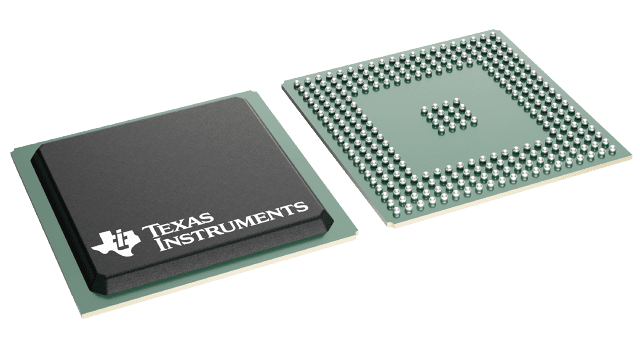Información de empaque
| Encapsulado | Pines BGA (ZDP) | 272 |
| Rango de temperatura de funcionamiento (℃) -40 to 105 |
| Cant. de paquetes | Transportador 40 | JEDEC TRAY (5+1) |
Características para TMS320C6711D
- Excellent-Price/Performance Floating-Point Digital Signal Processor (DSP):
- TMS320C6711D
- Eight 32-Bit Instructions/Cycle
- 167-, 200-, 250-MHz Clock Rates
- 6-, 5-, 4-ns Instruction Cycle Time
- 1000, 1200, 1500 MFLOPS
- Advanced Very Long Instruction Word (VLIW) C67x™ DSP Core
- Eight Highly Independent Functional Units:
- Four ALUs (Floating- and Fixed-Point)
- Two ALUs (Fixed-Point)
- Two Multipliers (Floating- and Fixed-Point)
- Load-Store Architecture With 32 32-Bit General-Purpose Registers
- Instruction Packing Reduces Code Size
- All Instructions Conditional
- Eight Highly Independent Functional Units:
- Instruction Set Features
- Hardware Support for IEEE Single-Precision and Double-Precision Instructions
- Byte-Addressable (8-, 16-, 32-Bit Data)
- 8-Bit Overflow Protection
- Saturation
- Bit-Field Extract, Set, Clear
- Bit-Counting
- Normalization
- L1/L2 Memory Architecture
- 32K-Bit (4K-Byte) L1P Program Cache (Direct Mapped)
- 32K-Bit (4K-Byte) L1D Data Cache (2-Way Set-Associative)
- 512K-Bit (64K-Byte) L2 Unified Mapped RAM/Cache (Flexible Data/Program Allocation)
- Device Configuration
- Boot Mode: HPI, 8-, 16-, 32-Bit ROM Boot
- Endianness: Little Endian, Big Endian
- Enhanced Direct-Memory-Access (EDMA) Controller (16 Independent Channels)
- 32-Bit External Memory Interface (EMIF)
- Glueless Interface to Asynchronous Memories: SRAM and EPROM
- Glueless Interface to Synchronous Memories: SDRAM and SBSRAM
- 256M-Byte Total Addressable External Memory Space
- 16-Bit Host-Port Interface (HPI)
- Two Multichannel Buffered Serial Ports (McBSPs)
- Direct Interface to T1/E1, MVIP, SCSA Framers
- ST-Bus-Switching Compatible
- Up to 256 Channels Each
- AC97-Compatible
- Serial-Peripheral-Interface (SPI) Compatible (Motorola™)
- Two 32-Bit General-Purpose Timers
- Flexible Software Configurable PLL-Based Clock Generator Module
- A Dedicated General-Purpose Input/Output (GPIO) Module With 5 Pins
- IEEE-1149.1 (JTAG
 ) Boundary-Scan-Compatible
) Boundary-Scan-Compatible - 272-Pin Ball Grid Array (BGA) Package (GDP and ZDP Suffixes)
- CMOS Technology
- 0.13-µm/6-Level Copper Metal Process
- 3.3-V I/O, 1.4-V Internal (-250)
- 3.3-V I/O, 1.20-V Internal

TMS320C67x and C67x are trademarks of Texas Instruments.
Motorola is a trademark of Motorola, Inc.
All trademarks are the property of their respective owners.
 IEEE Standard 1149.1-1990 Standard-Test-Access Port and Boundary Scan Architecture.
IEEE Standard 1149.1-1990 Standard-Test-Access Port and Boundary Scan Architecture.
 These values are compatible with existing 1.26V designs.
These values are compatible with existing 1.26V designs.
TMS320C6000 is a trademark of Texas Instruments.
Windows is a registered trademark of the Microsoft Corporation.
 Throughout the remainder of this document, the TMS320C6711D shall be referred to as its individual full device part number or abbreviated
as C6711D or 11D.
Throughout the remainder of this document, the TMS320C6711D shall be referred to as its individual full device part number or abbreviated
as C6711D or 11D.
Descripción de TMS320C6711D
The TMS320C67x™ DSPs (including the TMS320C6711, TMS320C6711B, TMS320C6711C, TMS320C6711D
devices ) compose the floating-point DSP family in the TMS320C6000™ DSP platform. The C6711, C6711B, C6711C, and C6711D devices are based on the high-performance, advanced very-long-instruction-word (VLIW) architecture developed by Texas Instruments (TI), making these DSPs an excellent choice for multichannel and multifunction applications.
) compose the floating-point DSP family in the TMS320C6000™ DSP platform. The C6711, C6711B, C6711C, and C6711D devices are based on the high-performance, advanced very-long-instruction-word (VLIW) architecture developed by Texas Instruments (TI), making these DSPs an excellent choice for multichannel and multifunction applications.
With performance of up to 1200 million floating-point operations per second (MFLOPS) at a clock rate of 200 MHz or up to 1500 MFLOPS at a clock rate of 250 MHz, the C6711D device also offers cost-effective solutions to high-performance DSP programming challenges. The C6711D DSP possesses the operational flexibility of high-speed controllers and the numerical capability of array processors. This processor has 32 general-purpose registers of 32-bit word length and eight highly independent functional units. The eight functional units provide four floating-/fixed-point ALUs, two fixed-point ALUs, and two floating-/fixed-point multipliers. The C6711D can produce two MACs per cycle for a total of 400 MMACS.
The C6711D DSP also has application-specific hardware logic, on-chip memory, and additional on-chip peripherals.
The C6711D device uses a two-level cache-based architecture and has a powerful and diverse set of peripherals. The Level 1 program cache (L1P) is a 32-Kbit direct mapped cache and the Level 1 data cache (L1D) is a 32-Kbit 2-way set-associative cache. The Level 2 memory/cache (L2) consists of a 512-Kbit memory space that is shared between program and data space. L2 memory can be configured as mapped memory, cache, or combinations of the two. The peripheral set includes two multichannel buffered serial ports (McBSPs), two general-purpose timers, a host-port interface (HPI), and a glueless external memory interface (EMIF) capable of interfacing to SDRAM, SBSRAM and asynchronous peripherals.
The C6711D has a complete set of development tools which includes: a new C compiler, an assembly optimizer to simplify programming and scheduling, and a Windows™ debugger interface for visibility into source code execution.
